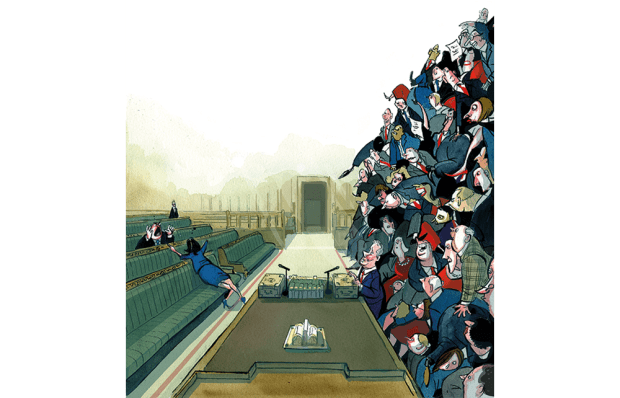Balance of power
Sir: Ross Clark sums up the problem with wind power (‘Storing up trouble’, 13 November). It is often inadequate or alternatively excessive, leading in the latter case to the ludicrous position of making payments to operators for producing nothing. A solution to the question of storing electricity to even out the peaks and troughs of wind power would clearly be of great benefit in our quest for net zero. Mr Clark does not appear to be keen on batteries, which make demands on our finite sources of rare metals and can be dangerously volatile. Pumped water storage has limited application.
What he did not mention was hydrogen. It should surely be possible to link wind turbines not only to the National Grid but also to a series of plants producing hydrogen by electrolysis which could use any excessive wind power and then be stored to replace the carbon-emitting fuel in gas-powered stations.
Sam Dunning
Guildford
97 per cent
Sir: The problem with Nigel Lawson’s view that the climate change ‘crisis’ is based on ‘mass hysteria’ and ‘ignorance’ (‘Stupid fuels’, 6 November) is that it casts the 97 per cent of climate scientists as the ignorant victims of mass hysteria. Although the 97 per cent figure (publicised by Nasa and based on a study by John Cook in 2013) has been contested, notably by the Competitive Enterprise Institute, a libertarian group funded by ExxonMobil, subsequent peer-reviewed studies have confirmed it. From which it follows that, despite being specialists in their field, nearly all climate scientists must either be too ignorant to understand the available data, or victims of ‘group think’ and mass hallucination.
On the other hand, it may be that the 97 per cent are right and the 3 per cent are wrong. The latter are not modern-day Galileos, but the beneficiaries of generous funding from the fossil fuels industry.
Alistair Miller
The Salisbury Review, Shefford, Beds
Where’s our Baldwin?
Sir: Fraser Nelson suggests we have a prime minister who does not care which direction the bus is going, provided he is in the driving seat (‘Court of chaos’, 13 November). We have been here before. A hundred years ago Conservative MPs tired of the erratic behaviour of the then prime minister, Lloyd George. They pulled out of the coalition and ushered in the 15 years of calm leadership in government and opposition of Stanley Baldwin. Is there another Baldwin on the government benches today? I do hope so.
Sir David Madel (Conservative MP 1970-2001)
London W2
Checkered past
Sir: It was a pleasure to read Jamie Njoku-Goodwin’s article on underground chess (‘Pawn hub’, 13 November). The best underground chess scene I’ve known is in HMP Wandsworth. Every week we bring a chess club to these prisoners. On top of the cognitive benefits playing chess affords, particularly to men subjected to interminable boredom, it is a cheerful club in an otherwise cheerless place. The ability of certain players is also astonishing — they give us a good game! We even made it to the final round of the world prison chess championship this year. Unfortunately Mongolia won, but we will come back in 2022 with a vengeance.
The men tell us that during chess club, they sometimes forget they are in prison. It is rare to hear something so rewarding. If anyone is interested in volunteering anywhere in the country, please contact info@chessinschools.co.uk.
Lily Geidelberg
London
A betrayal of principles
Sir: In his superb analysis of the extrusion of Owen Paterson from the House of Commons (‘Why parliament is in such bad order’, 13 November), Douglas Murray defined a fundamental principle of parliamentary democracy and British justice. In stark contrast, Boris Johnson betrayed these principles when he abandoned Paterson to the mob. Unlike Johnson, Margaret Thatcher would have defined the ethical issue as primary.
Paul Trewhela
Aylesbury, Buckinghamshire
Doctor deterrents
Sir: James Forsyth (Politics, 4 November) blames the government for ‘dragging its feet on making it easier for doctors from countries with high-quality medical training … to come and work here.’ For once the government is largely in the clear — the blame for the blockage should be placed at the door of the General Medical Council (GMC), which lays numerous barriers in the way of doctors from these countries, many of whom have trained in the UK before seeking higher qualifications abroad. In cases known to me personally, the rules seem to make the incomers (or returners) surmount hurdles higher than those who trekked through the NHS. Perhaps if the GMC was encouraged to recognise the standards of medical training in the named countries more rapidly, we could reduce the deficit in specialties which will be essential to clearing the backlog.
Andrew R. Forsyth
Harrogate, North Yorkshire
Lady Bullard’s book
Sir: My thanks to Matthew Parris (‘The wife’s story’, 25 September) for alerting readers to Margaret Bullard’s account of her life as the spouse of the diplomat Sir Julian Bullard. One admires Sir Julian hugely, but no less the accomplishments of his splendid wife. Were she not so fully engaged, doubtless Lady Bullard would have been hailed as the first woman to conquer Everest.
NB: I found that the book is only available through St Hilda’s College, Oxford, with all profits going toward student bursaries. A bargain at £12!
Christine Garrett
London
Got something to add? Join the discussion and comment below.
Get 10 issues for just $10
Subscribe to The Spectator Australia today for the next 10 magazine issues, plus full online access, for just $10.
You might disagree with half of it, but you’ll enjoy reading all of it. Try your first month for free, then just $2 a week for the remainder of your first year.














Comments
Don't miss out
Join the conversation with other Spectator Australia readers. Subscribe to leave a comment.
SUBSCRIBEAlready a subscriber? Log in